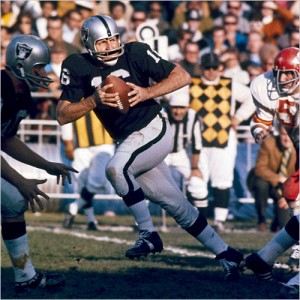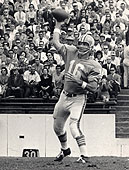Remembering George Blanda: The 2,000-Point Man

George Blanda had a lot of late game magic left when he joined the Oakland Raiders in 1967 at the age of 40.
The sports world lost one of its legendary stars on Monday with the passing of Hall of Fame quarterback and kicker George Blanda at the age of 83. Unlike no other player before him or since, Blanda truly had two separate careers in pro football that combined to make him one of the legendary players of his era (or eras).
Blanda, who played a record 26 years in professional football and didn’t retire from the NFL until the age of 48, is best remembered for his nine-year stint as the crusty old kicker and miracle maker for the Oakland Raiders of the late 1960s and early 1970s. However, his career transcended generations and connected legends.
Originally from western Pennsylvania, Blanda traveled to the University of Kentucky to play college football. It was there that he had his first encounter with a sports legend as Paul “Bear” Bryant became head coach of the Wildcats prior to Blanda’s sophomore season.
Bryant wasn’t yet the dominant figure in college coaching when he took over a Kentucky team that had won only one game the previous season and willed them to seven victories in 1946 and then eight wins and their first-ever bowl appearance the following season. During Blanda’s senior season, in which he played quarterback and kicker, the Wildcats went 5-3-2.
Drafted in the 12th round of the 1949 NFL draft by George Halas and the Chicago Bears, Blanda joined a team in Chicago that was already crowded at quarterback with the presence of Sid Luckman, who was completing a Hall of Fame career, and former Notre Dame star Johnny Lujack.
Blanda’s ability to kick and punt helped him earn a roster spot in 1949 and he converted seven of 15 field goals while also punting 19 times for an average of 39.3 yards per kick. He struggled during his few chances at quarterback as he threw five interceptions in 21 pass attempts.
He played briefly in 1950 for the Baltimore Colts before returning to Chicago and seeing action at multiple places in an attempt to get time on the field.
Blanda played linebacker in 1951, but returned to quarterback in 1952 and by 1953 was the starer for the Bears. The 1953 season proved to be his best as a quarterback for the Bears as he completed 46.7% of his passes for 2,164 yards with 14 touchdowns and 23 interceptions.

George Blanda never was able to establish himself as a star quarterback while with the Chicago Bears.
An injury during the 1954 season knocked Blanda out of the lineup and he was never able to regain the starting quarterback position with the Bears.
Instead, he contributed primarily with his foot as Blanda became one of the leading kickers in the NFL. In 1955 he converted a league best 63.8% of his field goals and the following season connected on a league-high 45 of 47 extra points as the Bears reached the NFL Championship Game.
Blanda’s relationship with George Halas was never a warm one and frustrated with playing time at quarterback and after a contract squabble, Blanda retired following the 1958 season.
It was the formation in 1960 of the American Football League that would turn Blanda into a football legend.
Dusting off his helmet to play quarterback for the Houston Oilers, the 33-year-old Blanda demonstrated immediately that he could still sling the pigskin. Embracing the wide-open offensive style of the AFL, Blanda tossed 24 touchdown passes and totaled 2,413 yards through the air while leading the Oilers to a 10-4 record and a spot in the first-ever AFL Championship Game.
In the title game against the Los Angeles Chargers, Blanda passed for 301 yards, including an 88-yard touchdown strike to Billy Cannon in the fourth quarter that sealed the 24-16 victory.
The Oilers repeated as AFL Champions in 1961 as their high-flying offense averaged 36 points per game. Blanda passed for 3,330 yards and threw a pro football record 36 touchdown passes. It is a mark that would stand until being broken by Dan Marino in 1984.
Blanda spent seven seasons slinging passes for the Oilers. He threw 20 or more touchdown passes in five of those seasons, but the high-risk passing game also resulted in a lot of interceptions. Blanda led the league in passes intercepted four straight years, including a record 42 interceptions in 1962.
While Blanda was earning accolades for his quarterback play, he was also continuing to serve as one of the best straight-on kickers of his era. He scored 115 points during the 1960 season and compiled 598 points during his time in Houston.
At the age of 40, Blanda was replaced at quarterback in Houston following the 1966 season. However, instead of retiring, Blanda was again rescued from the scrap heap.
Oakland Raiders owner Al Davis signed Blanda to serve as his kicker and backup quarterback. It was this pairing that would put Blanda in the Hall of Fame.
In his first season in Oakland, Blanda led the AFL with 116 points and helped the Raiders reach the second Super Bowl. He followed that up with a 117-point campaign in 1968 and 105 points in 1969.
Ironically, though his point total declined to 84 in 1970, it was that season that established Blanda as a superstar. The season included an amazing stretch of five straight games during which Blanda provided late game heroics either with his foot or his arm.
It started against Pittsburgh on October 25th when Blanda replaced an injured Daryle Lamonica and tossed three touchdown passes. The next week he launched a 48-yard field goal in the final seconds to tie rival Kansas City 17-17.
The following week he came off the bench to tie a battle against Cleveland with a touchdown pass and then won the game with an improbable 53-yard field goal. Another late touchdown pass the following week against Denver sealed a 24-19 victory. His streak concluded with a 16-yard field goal in the final seconds to defeat the San Diego Chargers.
The then 43-year old Blanda’s magic ran out against Baltimore in the AFC Championship game as he threw two touchdowns to keep Oakland in the game, but threw two late picks as the Colts held on for victory.
Blanda was honored as the winner of the Bert Bell NFL Player of the Year Award. He remains the oldest player ever to earn that award, a distinction that is not likely to ever be topped.
The grizzled veteran spent five more seasons with the Raiders, but after the 1971 season and the emergence of quarterback Ken Stabler, Blanda’s role was primarily limited to kicking duties.
In 1975, he became the first player in NFL history to pass the 2,000 career point mark, a total that at the time was thought to be un-reachable. He retired following the 1975 season with 2002 career points, a mark that still ranks fifth in NFL history. He also passed for 26,920 yards and 236 career touchdowns.
In all, Blanda played a record 26 seasons of professional football, a mark that seems destined never to be broken. He also ranks fourth all-time having played in 340 career games.
There have been better quarterbacks and better kickers than George Blanda, but his ability to combine those talents into a 26-year career made him one of the all-time sports legends.

We remember following Blanda's long career and marveling at his longevity. As stated, doubt if anyone in the modern game will surpass his 26 seasons in the professional football. Thanks for the memories! C & D
famctpw